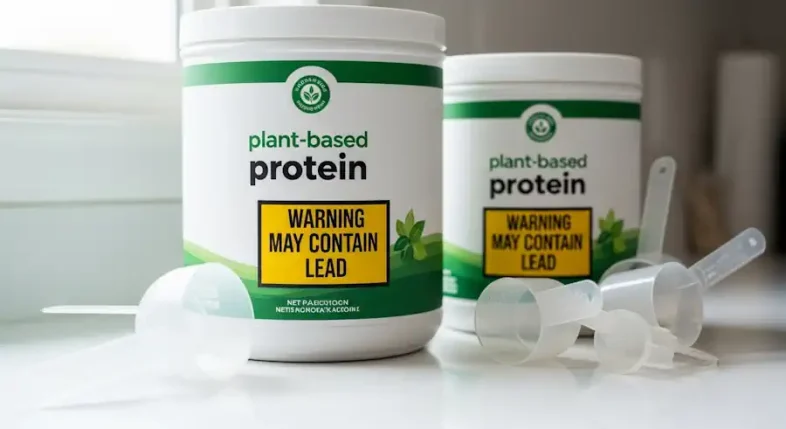A new investigation has reignited concerns about toxic metals lingering in popular protein powders and ready-to-drink shakes. Independent testing points to elevated levels of lead in many products, with plant-based formulas appearing most affected. The findings arrive as protein supplements surge in popularity and regulation trails behind. Consumers who rely on powders for everyday nutrition may need to rethink brand choices and frequency of use.
Troubling Results From Independent Testing
Consumer Reports tested 23 widely sold protein powders and shakes from major retailers and online sellers. Roughly seven in ten exceeded the organization’s internal safety threshold for lead per serving. Two specific products were flagged as potentially unsafe for regular consumption based on their measured levels.
Testers purchased multiple lots to account for batch variability and found that contamination patterns persisted across samples. The majority of problematic results were concentrated in plant-based formulas made from pea, rice, or hemp proteins. Although not every product failed, the overall trend suggested a systemic quality and sourcing issue rather than isolated defects.
Why Plant-Based Powders Are Most Affected
Botanically derived ingredients can absorb heavy metals from soil and water during cultivation. Rice is known to draw in arsenic and can carry lead depending on growing conditions. Pea and soy crops may also accumulate trace elements influenced by regional geology, irrigation sources, and agricultural practices.
Trace metals are not always dangerous in a single serving. The risk grows with cumulative exposure over time. Chronic intake of lead can contribute to kidney and nervous system damage, and long-term exposure is particularly concerning for children and pregnant individuals due to potential developmental effects.
A Growing Market With Limited Oversight
Protein powders have moved from niche fitness circles to mainstream kitchens. The U.S. market is valued in the billions, with plant-based options among the fastest-growing segments. Convenience, weight management goals, and high-protein diet trends all fuel demand.
Regulatory oversight has not kept pace. Dietary supplements do not require premarket approval by the U.S. Food and Drug Administration. Manufacturers are largely responsible for their own quality controls, and enforcement typically occurs after problems surface. This framework can leave consumers with limited transparency about contaminants or sourcing.
Two Studies, One Persistent Signal
Earlier analyses from independent groups reported widespread heavy metal findings in protein powders. The latest Consumer Reports testing aligns with those prior signals and suggests little improvement in certain categories.
While both reviews note that occasional use of most products is unlikely to cause harm, they caution against high-frequency consumption. People who drink multiple servings daily or who belong to sensitive groups face higher cumulative exposure, making product selection and serving frequency more critical.
Industry and Expert Reactions
Supplement makers argue that trace metals occur naturally and that detected amounts are often below statutory limits. They also point to internal testing and good manufacturing practices as safeguards. However, independent experts counter that wide variability across brands and lots shows the need for tighter standards and clearer disclosures.
Dietitians emphasize a food-first approach to protein. Eggs, dairy, yogurt, legumes, poultry, and fish provide complete or complementary amino acid profiles with additional nutrients and fiber in many cases. Powders can fill gaps, but routine reliance may crowd out whole foods while adding contamination risk.
How Consumers Can Protect Themselves
Look for third-party certifications that test for contaminants and verify label accuracy. Programs such as NSF Certified for Sport or USP Verified can offer added assurance beyond a brand’s internal claims. Certifications are not guarantees, but they indicate an extra layer of checks.
Assess transparency. Prefer companies that publish batch test results, specify sourcing regions, and list full ingredient details rather than proprietary blends. Rotate protein sources to avoid repeated exposure to a single ingredient, and consider reducing servings if powders are a daily habit.
Calls for Stronger Oversight
Consumer advocates urge regulators to set clearer limits for heavy metals in supplements and to standardize testing protocols. Proposals include product registration, routine reporting of contaminant data, and public databases that allow shoppers and clinicians to compare brands.
Bringing supplement oversight closer to packaged food standards could reduce batch-to-batch variability and incentivize safer sourcing. It could also reward manufacturers that invest in rigorous testing and supply chain controls.
What This Means for Everyday Consumers
Protein powders remain a convenient way to boost intake, but they are not risk-free. For most healthy adults, occasional use alongside a varied diet is unlikely to pose a problem. The equation changes with frequent servings, sensitive life stages, or reliance on plant-based blends with inconsistent testing.
The practical path forward is to prioritize whole-food proteins, vet supplement brands carefully, and treat powders as additions rather than anchors of daily nutrition. Until standards tighten and transparency improves, informed caution is the safest approach.


